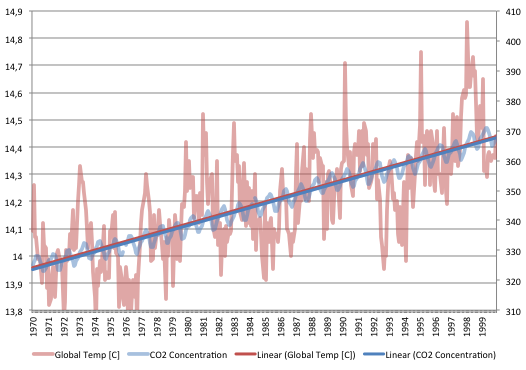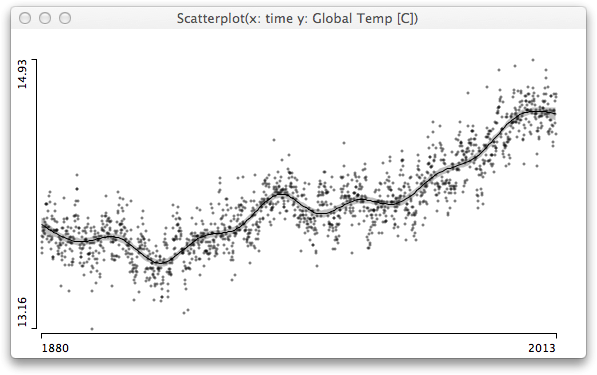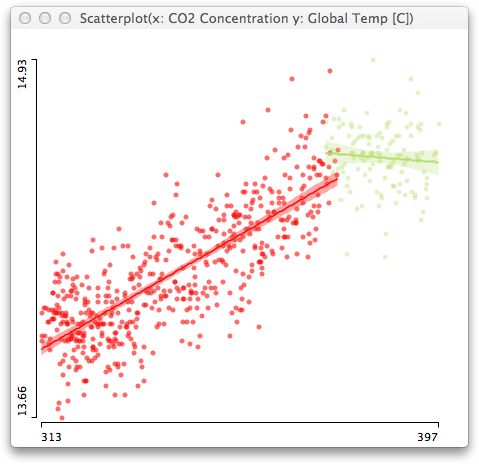Global Warming: Causality vs. Timeframes
The weather channel wetter-online pointed me to the latest global temperature anomalies which made me think about this post. Everybody knows that worldwide temperatures are rising. Rising as well does the concentration of CO2, which is literally fueled by burning fossil fuels. Ok, here goes the proof that rising CO2 levels correspond to rising temperatures:

As CO2 is the “most famous” greenhouse gas and thus causes temperatures to rise, the whole thing fits – at least for the timeframe we are looking at, which is 1970 to 2000. (OK, putting the two quantities on selected separate scales is a bit cheesy, but this is how media will sell these topics to us …)
Looking at the temperatures from 1880 to 2013 alone, gives rise to new questions when we look at the last decade:

Looking at the smoothing spline for the monthly data, we see that global warming has stalled for almost a decade now – temperatures even seem to fall slightly.
From the first plot we know that CO2 concentration rises steadily, even in the last decade. So let’s take a look at the correlation between global temperatures and CO2 concentration.

A simple linear regression for the years 1953 to 2003 (red dots) supports the causal relationship, and is supported with an R2 of 0,61. Temperatures rose roughly 0.01 degrees centigrade per 1 ppmv. This was an easy to use model, which leads to apocalyptic temperatures when being projected some decades to the future, as CO2 concentration rises roughly 2ppmv per year right now.
Looking at the timeframe of 2003 to 2013 (green dots), the linear trend is slightly negative with an R2 of 0,005, which leads to the conclusion that CO2 does not really have an influence on the global temperatures right now. Brushing over an arbitrary decade shows, that this change is really unique since the mid 60s:
But what is the conclusion now? Is the whole CO2 story bogus? The answer is a clear maybe. Doubtlessly, it is stupid to burn the very limited resources of fossil fuels at the rate we are doing right now – especially after fracking became the salvation for all global energy problems. There is no way around using regenerative energy sources which are CO2 neutral and thus are no threat to the climate.
Do we fully understand the changes in global climate? A clear “No”. The timeframes we are looking at for which we have reliable data is so small compared to the timeframe global climate changes occur, that it is hard to derive final conclusions from what happened in the last decades. Nonetheless, we can stop doing stupid thing, and e.g. sell our gas guzzling SUV tomorrow!
(Thanks to D Kelly O’Day’s blog at http://chartsgraphs.wordpress.com which was inspiration and guide to data as well. The data are taken from GISS and NOAA.)




Certainly there’s a lot we don’t understand, but we have a much better understanding of temperature change than this post suggests. A couple pieces of context that help:
If you annotate annual temperatures with La Nina and El Nino, you can see there’s three La Nina years in the past decade, all warmer than previous La Nina years, but relatively cool. Removing those has a significant impact on the apparent trend in the past decade:
http://en.wikipedia.org/wiki/File:Enso-global-temp-anomalies.png
Also, climate has a lot of variability… the unusually smooth rise in temperature in the latter half of the 20th century is coincidental. But if you look at the big picture, the wiggles that are typical of climate variability are swamped by rapid warming in the past century:
http://rankexploits.com/musings/wp-content/uploads/2010/09/Proxy-Reconstruction-Comparison5.png
So it should be no surprise if we see a temperature plateau or even a decline in temperature… these would typically be followed by temperature increases that were all the stronger, since they’d sum long-term trends with short-term increases following short-term decreases.
We know a lot about the climate system, and boiling it all down to a simple time-series analysis like this misrepresents that knowledge.
[…] years ago, I did post the data on the CO2 and global temperature relationship. The conclusion was: at least in the last 10 years, CO2 concentration kept rising, but the global […]